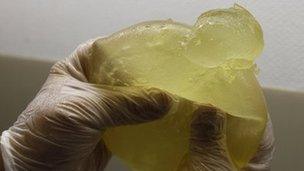PIP breast implants: European Commission says reform needed
- Published

The implants were manufactured by the French company Poly Implant Prothese (PIP)
The PIP breast implant scandal "reinforces" the need to reform Europe-wide regulation, according to the European Commission.
About 300,000 implants were sold around the world, many of them to the European market.
Commission proposals, to be presented later this year, are likely to recommend tougher rules.
Cosmetic surgeons have called for more spot checks and a register of all devices implanted into the body.
French, German and Dutch health authorities have all recommended that women fitted with banned PIP implants should have them removed as a precaution.
The UK has said there is no need for routine removal, but that women should be able to have the implants taken out by private clinics or the NHS if they are anxious.
A new government advertisement was published in English newspapers on Saturday, , externalrepeating its position. The chief medical officer, Professor Dame Sally Davies, said the government had already been issuing the advice through a number of sources.
"What we're doing... this weekend is making sure the clarity of the information, with the advice from an expert group involving plastic surgeons, is out there for the whole population to see."
In the UK, private cosmetic companies have been urged to remove implants they fitted - however, some have said it would be unaffordable and have blamed a failure of regulation.
'Tougher'
Breast implants in Europe are regulated by the 2007 directive on medical devices. The European Commission has been reviewing the rules for the past three years and is due to give its recommendations this year.
There are more than 10,000 medical devices ranging from class I devices such as plasters, class IIa and IIb which include X-ray machines and class III, such as breast implants, pacemakers and hip replacements.
Frederic Vincent, health and consumer policy spokesperson for the European Commission, told the BBC: "It [PIP] reinforces our opinion that we have to be tougher on medical devices, particularly class III."
In order for a product to be placed on the market in the EU it needs to be given a CE mark to show it has reached health and safety standards. He said the thinking was to keep the CE label, but there could be debate around being "a bit more tough for things like breast implants and pacemakers".
CE marks are awarded by one of up to 80 "notified bodies".
Mr Vincent said a new directive could ask the member states to be "more stringent" when appointing and monitoring the notified bodies as some were "more serious than others".
However, he added: "We are dealing with a case of fraud. It means that what happened in France could have happened even with a more stringent pre-market assessment of the products."
Gemma Pepper is taking part in a protest in London, which is calling on the government to do more to help the women who have been affected.
"I just feel like with these adverts the government has come out and they are still pretty much sitting on the fence," she said.
"And as long as they say they're not dangerous, the clinics are gripping hold of that and sticking to it like glue basically, because they are refusing... to do anything at all as long as the government continues to say this."
Once a product is on the market it is the responsibility of national bodies, such as the UK's Medicines and Healthcare products Regulatory Agency, to monitor the medical devices.
The commission is discussing enhancing the co-ordination between the national bodies in a new directive.
Another idea likely to be recommended is an improved way of monitoring what happens to implanted medical devices, such as a record of all those fitted into a patient.
The formal proposals will be sent to the EU Parliament and the Council of Ministers for approval. However, it could take up to three years before they are adopted by member states.
Nigel Mercer, former president of the British Association of Aesthetic Plastic Surgeons, told the BBC: "Throwing out the CE mark would be ridiculous, but it does need to be tightened up.
"There must be mystery shopping - visits at random, over a maximum of every two years so a company never knows when it is going to be assessed.
"There's got to be a mandatory register of all implants - pacemakers, buttock implants - if it's inside a human we need to know what happens to it."
A spokesperson for the Medicines and Healthcare products Regulatory Agency said: "It has been discovered that PIP had been using unauthorised silicone gel which is a clear violation of the CE Mark. The French authorities are currently investigating this as a criminal matter.
"We will be working closely with other health departments and regulators in Europe to consider whether there are wider implications for the regulation of implants and other medical devices."
- Published11 January 2012
- Published10 January 2012
- Published11 January 2012
- Published10 December 2013
- Published6 January 2012
- Published6 January 2012
- Published4 January 2012
- Published3 January 2012
- Published21 December 2011
- Published18 June 2010